Census Bureau Decennial Language Research Services, Focus Groups in Seven Languages
Generic Clearance for the Collection of Qualitative Feedback on Agency Service Delivery
Census Attachment A Moderator Guide_V3
Census Bureau Decennial Language Research Services, Focus Groups in Seven Languages
OMB: 0690-0030
Attachment A
Attachment A.1 Moderator’s Guide
The moderator’s guide will be translated to the six target languages in addition to the English version attached to this request.
Focus Group Moderator’s guide
English
Focus Group Moderator’s Guide
Language: 1. Spanish 2. Chinese 3. Korean 4. Vietnamese 5. Arabic 6. Russian 7. English
Date: ____/____/______ (mm/dd/yyyy) Start time: ___________ AM / PM
Proficiency: Monolingual Bilingual
Additional group characteristics (location, age, etc.): ______________________________
SECTION A. INTRODUCTION
Welcome! Thank you for coming to talk with us today. We know we all live busy lives so we really appreciate that you are taking a couple of hours of your day to help us review materials and statements that the Census Bureau has designed and would like to use in the 2020 Census.
Every ten years the United States conducts a census, or count, of everyone who is living in this country. The next census will take place in the year 2020, but the Census Bureau spends several years preparing for it and doing research to improve the census. This focus group is part of a Census Bureau research project.
My name is [MODERATOR NAME] and I will be guiding today's conversation. I work for [RTI International, a non-profit research organization/RSS, a research firm]. The Census Bureau has hired us to conduct this research.
IF APPLICABLE:
[POINT TO THE NOTE-TAKER] This is NAME. (S)he will assist me by taking notes and making everything runs smoothly.
We are in a focus group room with a one-way mirror. My colleagues who are working with me on this project can watch it from the other room without getting in our way.
Today I will show some video clips and go over a couple of Census-type questions in <TARGET LANGUAGE> with you and will ask your opinions about them. Your participation is very important because it will help the Census Bureau develop messages that would encourage [TARGET LANGAUGE] speaking people like you to participate in the 2020 Census and also be culturally appropriate.
Here is a consent form. It explains everything we will be doing and it asks for your permission to audio
and video record our conversation. It also explains that we will keep everything you say today confidential, meaning that we will group what everyone says and the results will not identify you personally and will only use it for research purposes to improve the Census materials in [TARGET
LANGUAGE]. If you have not read or signed the consent form, please read it and let me know if you
have any questions before signing it.
<DISTRIBUTE CONSENT FORM. ANSWER ANY QUESTIONS. COLLECT SIGNED FORMS>
Thank you. Some of you may have taken part in focus groups before and for others this may be your first time. Let me mention a few basic rules.
First, I will be asking a lot of questions. There are no right or wrong answers to my questions; we just want your honest opinions. We don't need to have everyone agree. In fact, if you have a view different from others it is especially important for us to hear it because you may be the only person who is representing a different point of view here today.
Only one person speaks at a time and we’d like everyone to get a turn. We need to hear what everyone has to say. Please do not have a side conversation with the person sitting next to you or speak while somebody else is talking. Please speak up and let us know what you are thinking. If you are the type of person who always participates, please give a chance to others to talk.
I may have to interrupt. Due to limited time, I must move the discussion along and may sometimes have to interrupt in order to do so. Please do not be offended – it is my job to cover a certain number of topics during the group period.
Please keep what everyone says here private. During the group conversation, we use first names only. We keep what you say entirely confidential and I ask that each of you treat confidentially what others say around the table. Your names will not be used in any reports.
Make yourselves comfortable. You may leave your seat at any time to use the bathroom or to stretch your legs, but please do so quietly. And please turn off your phone.
Does anyone have any questions before we start?
ICEBREAKER
Let's go around the room and have each of you tell us:
Your first name or nickname
where you were born, and
how long you have lived in the United States
Let me go first. My name is…
<GO ONE BY ONE AROUND THE ROOM.>
What do you like and dislike about living here?
<ENCOURAGE EACH PERSON TO SPEAK AND PROBE FOR AGREEMENT AND DIFFERENCE IN OPINION>
SECTION B. VIDEOS OF INTERVIEWER MESSAGES
Let’s get started! Let me give you a brief introduction of how the U.S. Census is conducted.
When it's time for the Census, people will receive a mailing that asks them to complete the census form on the internet or by mail.
If no response from an address has been received by a certain date, a Census Bureau interviewer will be sent in person to that address to ask the census questions of the people who live there.
The Census Bureau will not know in advance what language is spoken at a particular address. However, if the address is in an area where a high percentage of <TARGET LANGUAGE>-speakers live, it is likely that they will send a <TARGET LANGUAGE>-speaking interviewer.
I will show you 4 short videos. This is what the Census Bureau has designed to show some examples of situations that the interviewer may encounter to train Census interviewers. After watching each video, I will ask for your reaction and feedback.
<SHOW THE VIDEOS AND THEN ENCOURAGE A DISCUSSION USING ASSOCIATED PROBES. WHEN ALL VIDEO PART IS DONE ASK OVERALL PROBES>
<LANGUAGE BARRIER VIDEO>
This video shows a situation when the Census interviewer and the household respondent cannot complete a Census questionnaire in English because the respondent does not speak English well and the interviewer does not speak <TARGET LANGUAGE>. Please watch it while paying attention to the video especially about how the interviewer interacts with the respondents. After the video, I will ask several questions about your opinions and comments.
<SHOW LANGUAGE BARRIER VIDEO>
BL_1. What is your overall impression of this video?
BL_2. Is there anything you particularly liked about the interviewer in this video? What do you think other <TARGET LANGUAGE> speakers like you would like about the interviewer?
PROBE AND PROVIDE DETAILS IF NEEDED:
What the interviewer said (words, tone, attitude)?
Appearance? Gestures, eye contact?
BL_3. Is there anything you particularly disliked about the interviewer in this video? What do you think other <TARGET LANGUAGE> speakers like you would dislike about the interviewer?
PROBE AND PROVIDE DETAILS IF NEEDED:
What the interviewer said (words, tone, attitude)?
Appearance? Gestures, eye contact?
BL_4. Now I will hand out what the interviewer showed to the respondent. <HAND OUT LANGUAGE FLASH CARDS>.
Using this card, the interviewer can identify the language the respondent speaks and communicates in.
What do you think about this card?
Can a respondent easily find their language?
Do you think this card can work well in a situation like this?) Why or why not? [if necessary: for example, a situation where you and the interviewer do not speak the same language and cannot communicate].
Thanks. I’m going to show you the same video again. At this time, please pay attention to how the interviewer interacts with the respondent.
<SHOW LANGUAGE BARRIER VIDEO AGAIN>
BL_5. Is there anything you think the interviewer should do differently to encourage the respondent’s participation in the Census? What would that be?
<UNAWARE VIDEO>
Thank you. I have another video to show you. In this video, both the interviewer and the respondent speak the same language. Again, I will ask you some questions after you watch this video.
<SHOW UNAWARE VIDEO>
BU_1. What is your overall impression of this video?
BU_2. Is there anything you particularly liked about the interviewer in this video? What do you think other <TARGET LANGUAGE> speakers like you would like about the interviewer?
PROBE AND PROVIDE DETAILS IF NEEDED:
What the interviewer said (words, tone, attitude)?
Appearance? Gestures, eye contact?
BU_3. Is there anything you particularly disliked about the interviewer in this video? What do you think other <TARGET LANGUAGE> speakers like you would dislike about the interviewer?
PROBE AND PROVIDE DETAILS IF NEEDED:
What the interviewer said (words, tone, attitude)?
Appearance? Gestures, eye contact?
Thanks. I’m going to show you the same video again. Please pay attention to how the interviewer interacts with the respondent.
<SHOW UNAWARE VIDEO AGAIN>
BU_4. Thinking back to what the interviewer said to the respondents:
Was there anything that some <TARGET LANGUAGE> speakers may find confusing or difficult to understand?
Was there anything that did not sound natural or was inappropriate for your culture?
BU_5. Is there anything you think the interviewer should do differently in terms of what (s)he said or did? What would that be?
BU_6. If you were the <TARGET LANGUAGE> speaker in this video, would you be willing to complete the Census questionnaire after the interviewer talked with you? Why or why not?
<FEAR/MISTRUST OF GOVERNMENT VIDEO>
Thank you. Let me show you the next video. Again, I will ask you some questions after you watch this video.
<SHOW FEAR/MISTRUST OF GOVERNMENT VIDEO>
BF_1. What is your overall impression of this video?
BF_2. Is there anything you particularly liked about the interviewer in this video? What do you think other <TARGET LANGUAGE> speakers like you would like about the interviewer?
PROBE AND PROVIDE DETAILS IF NEEDED:
What the interviewer said (words, tone, attitude)?
Appearance? Gestures, eye contact?
BF_3. Is there anything you particularly disliked about the interviewer in this video? What do you think other <TARGET LANGUAGE> speakers like you would dislike about the interviewer?
PROBE AND PROVIDE DETAILS IF NEEDED:
What the interviewer said (words, tone, attitude)?
Appearance? Gestures, eye contact?
Thanks. I’m going to show you the same video again. Please pay attention to how the interviewer interacts with the respondent.
<SHOW UNAWARE VIDEO AGAIN>
BF_4. Thinking back to what the interviewer said to the respondents:
Was there anything that some <TARGET LANGUAGE> speakers may find confusing or difficult to understand?
Was there anything that did not sound natural or was inappropriate for your culture?
BF_5. Is there anything you think the interviewer should do differently in terms of what (s)he said or did? What would that be?
BF_6. If you were the <TARGET LANGUAGE> speaker in this video, would you be willing to complete the Census questionnaire after the interviewer talked with you? Why or why not?
<LOW ENGAGEMENT VIDEO>
Thank you. Let me show you the next video. Again, I will ask you some questions after you watch this video.
<SHOW LOW ENGAGEMENT VIDEO>
BE_1. What is your overall impression of this video?
BE_2. Is there anything you particularly liked about the interviewer in this video? What do you think other <TARGET LANGUAGE> speakers like you would like about the interviewer?
PROBE AND PROVIDE DETAILS IF NEEDED:
What the interviewer said (words, tone, attitude)?
Appearance? Gestures, eye contact?
BE_3. Is there anything you particularly disliked about the interviewer in this video? What do you think other <TARGET LANGUAGE> speakers like you would dislike about the interviewer?
PROBE AND PROVIDE DETAILS IF NEEDED:
What the interviewer said (words, tone, attitude)?
Appearance? Gestures, eye contact?
Thanks. I’m going to show you the same video again. Please pay attention to how the interviewer interacts with the respondent.
<SHOW UNAWARE VIDEO AGAIN>
BE_4. Thinking back to what the interviewer said to the respondents:
Was there anything that some <TARGET LANGUAGE> speakers may find confusing or difficult to understand?
Was there anything that did not sound natural or was inappropriate for your culture?
BE_5. Is there anything you think the interviewer should do differently in terms of what (s)he said or did? What would that be?
BE_6. If you were the <TARGET LANGUAGE> speaker in this video, would you be willing to complete the Census questionnaire after the interviewer talked with you? Why or why not?
<Overall Reactions to the Videos>
BO_1. Thinking back to all 4 videos we just saw, what did the interviewer say that was MOST LIKELY to encourage <TARGET LANGUAGE> speakers to participate?
BO_2. In general, what statements would be MOST LIKELY to encourage <TARGET LANGUAGE> speakers to participate in the Census?
BO_3. [Using flipchart] What are some reasons why people do not participate in the Census?
What would be your main concern that would make you less likely to participate? What about [SPECIFIC ETHNICITY] in general?
BO_4. The Census will be offered in several modes such as Internet, telephone, and in-Person. What do you think about these options? Would these modes affect <TARGET LANGUAGE> speakers to participate in the Census?
BO_5. What are some appropriate behaviors, such as gesture, attitude, eye contact, tone, or appearance that an interview should display, when encouraging <TARGET LANGUAGE> speakers to participate in the Census?
BO_6. What seems [strange, out of order, weird] with the message in [video number or content] video? What would make it better? What would make it easier to understand?
SECTION C. VIGNETTE
INSTRUCTIONS
If there is enough time in the focus group do both vignettes. In in event of running out of time drop vignette 1 in half of cases and vignette 2 in other half.
Vignette #1 – Proxy reporting of English-speaking ability
Thank you. Now we will do something a little different. I will hand out a sheet of paper which has a few questions. While I’m doing this, please think of a person you know whose first language is <TARGET LANGUAGE> but speaks English.
<HAND OUT THE LANGUAGE SHEET AND HAVE RS WRITE DOWN THEIR ID AT THE BOTTOM>
Once you get the sheet, please write down your ID at the bottom of the sheet and fill out the questions while thinking of the person whose first language is <TARGET LANGUAGE> but speaks English.
<ONCE RESPONDENTS HAVE THE LANGUAGE SHEET, SHOW IT ON A FLIP CHART READ THE QUESTIONS ONE AT A TIME>
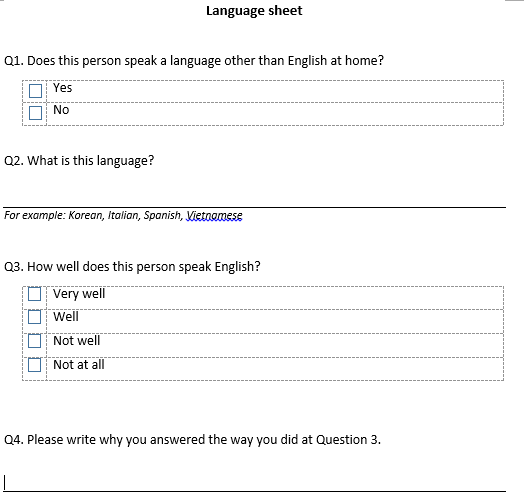
Now that you have filled this out I’m going collect the pens and we will talk about your answers. Remember there are no right or wrong questions, we just want to learn what you think.
C1_1. What did you write? How did you come up with your answer?
C1_2. Did anybody write anything else?
C1_3a. The Census Bureau sometimes asks questions like this one. We ask people to say how well another person speaks English. We’re trying to understand how people understand and answer these questions. When you answered the question about how well this person speaks English, what were you thinking about?
C1_3b. [IF NEEDED] Did you think only about speaking, or did you also think about reading, writing, and listening?
C1_3c. How easy or difficult was it to answer these questions for someone else? Please tell me about your experience seeing or hearing the person speak English. Could you give some details about how you know how well that person speaks English?
C1_4a. We’re also interested in how people choose between saying someone speaks English “well” and “very well”. What would a person have to be able to do in order to answer “very well”?
C1_4b. What is the difference between speaking English “well” and speaking “very well”? [IF NEEDED: What can people who speak ‘very well’ do that people who only speak ‘well’ cannot do?]
[Bilinguals only]
C2_2. Do you think the option of responding in a <TARGET LANGUAGE> motivates bilinguals to participate in the Census in the <TARGET LANGUAGE>?
Vignette #2 –US born children and race
Next, I am going to hand out another piece of paper. Please write down your ID at the bottom again.
<HAND OUT THE RACE SHEET AND HAVE RS WRITE DOWN THEIR ID AT THE BOTTOM>
Did everyone get one sheet? I will read the description shown here.
<SHOW THE RACE SHEET IN A LARGE SCREEN AND READ OUT THE VIGNETTE DESCRIPTION ALOUD.>
Maria and her husband Pedro both identify as <target origin> and were born in <TARGET COUNTRY>. They have a son who was born here in the US. How should they answer this question about their son? Please fill out the question according to the description.
Combined version:
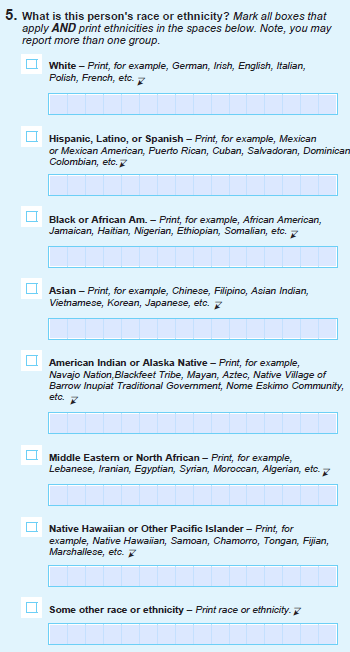
C2_1. What did you answer in this question? Please tell me what you wrote. <GO AROUND THE ROOM AND RECORD ALL RS’ ANSWERS ON A FLIPCHART>
C2_2. Would you tell me how you came up with your answer?
C2_3. Does any of you want to change your answer after hearing others’ opinions?
SECTION D. Language Information Sheet
Thank you for participating in today’s focus group. Please complete the following information sheet.
The following questions are about the English language. For each row, choose what best describes you: very well, well, not well, or not at all.
|
Very Well |
Well |
Not well |
Not at all |
DB1. How well do you speak English? |
|
|
|
|
DB2. How well do you read English? |
|
|
|
|
DB3. How well do you write in English? |
|
|
|
|
DB4. How well do you understand movies and videos in English? |
|
|
|
|
The next questions are about [target language].
|
Very Well |
Well |
Not well |
Not at all |
DB5. How well do you speak [target language]? |
|
|
|
|
DB6. How well do you read [target language]? |
|
|
|
|
DB7. How well do you write in [target language]? |
|
|
|
|
DB8. How well do you understand movies and videos in [target language]? |
|
|
|
|
Now, we would like to know how often you use English in certain situations. For each row, choose what best describes you: almost always, often, sometimes or “almost never.
Language use |
Almost always |
Often |
Some-times |
Almost never |
DA1. How often do you think in English? Would you say… |
|
|
|
|
DA2. How often do you speak English at home? Would you say… |
|
|
|
|
DA3. How often do you speak English with your friends? Would you say… |
|
|
|
|
On behalf of the Census Bureau, I want to thank everyone for your participation. Your feedback will be very helpful for the 2020 Census. Thank you again.
Attachment A.2 Materials To Be Used During Focus Group
Handout Language flash card
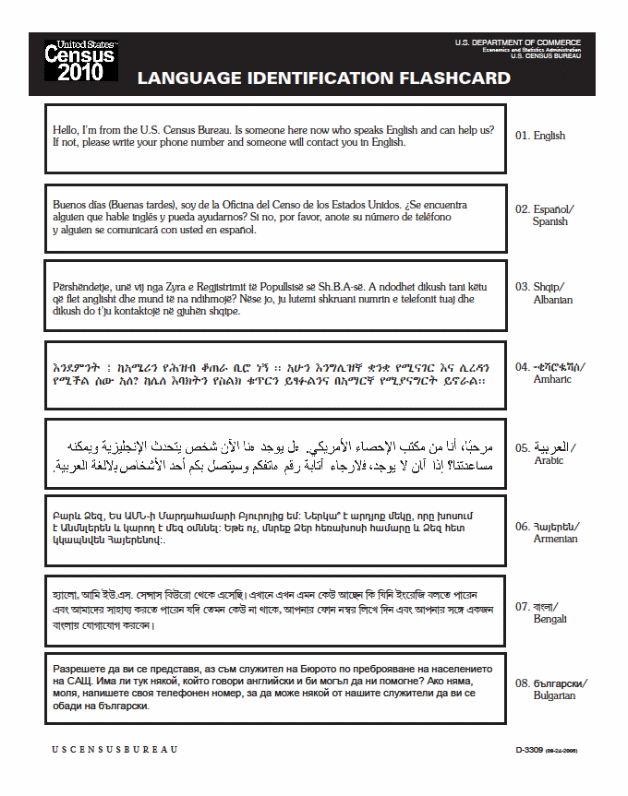
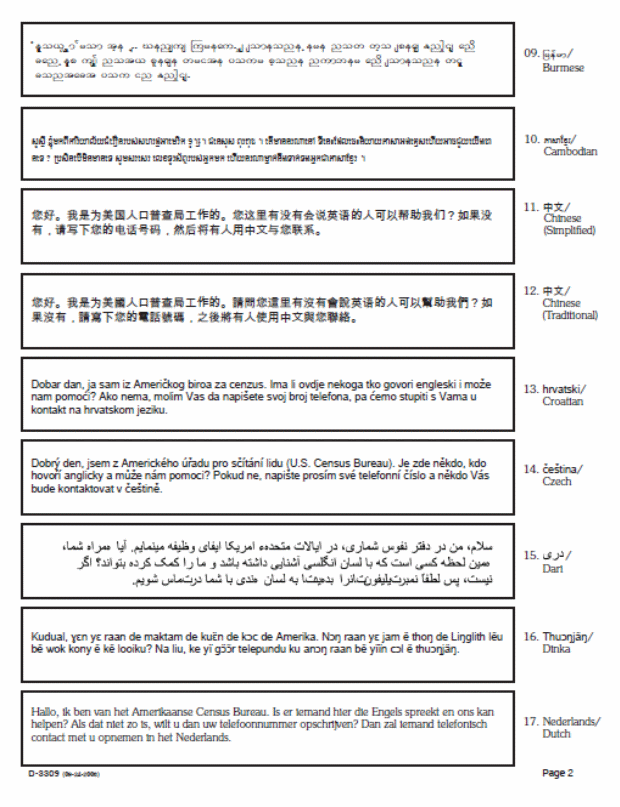
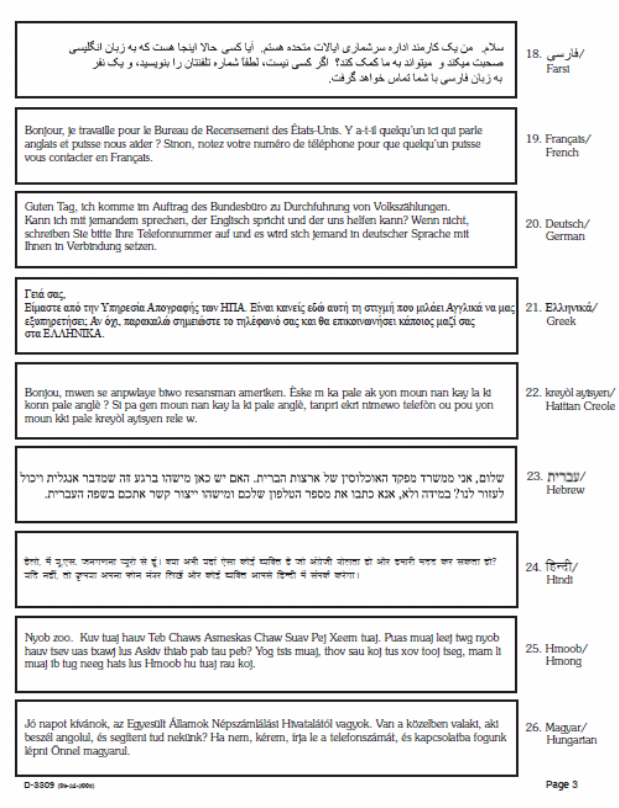
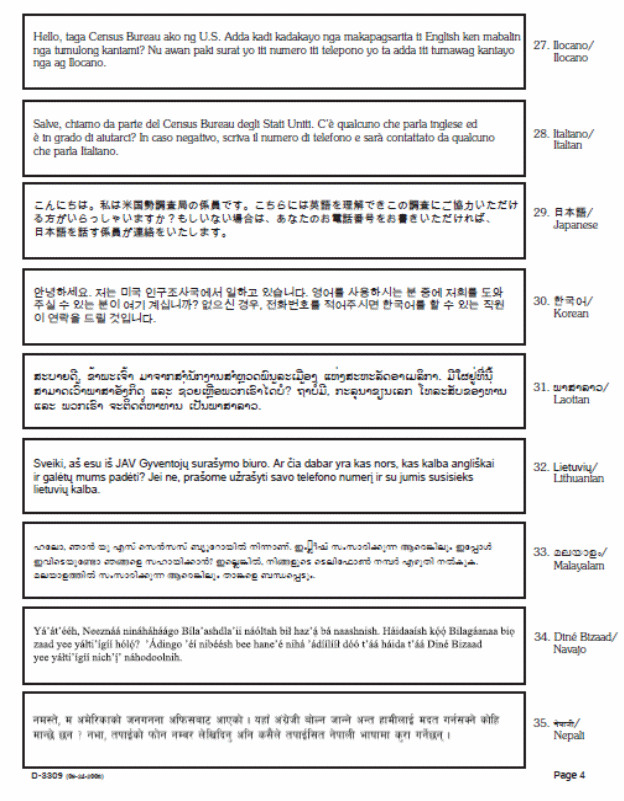
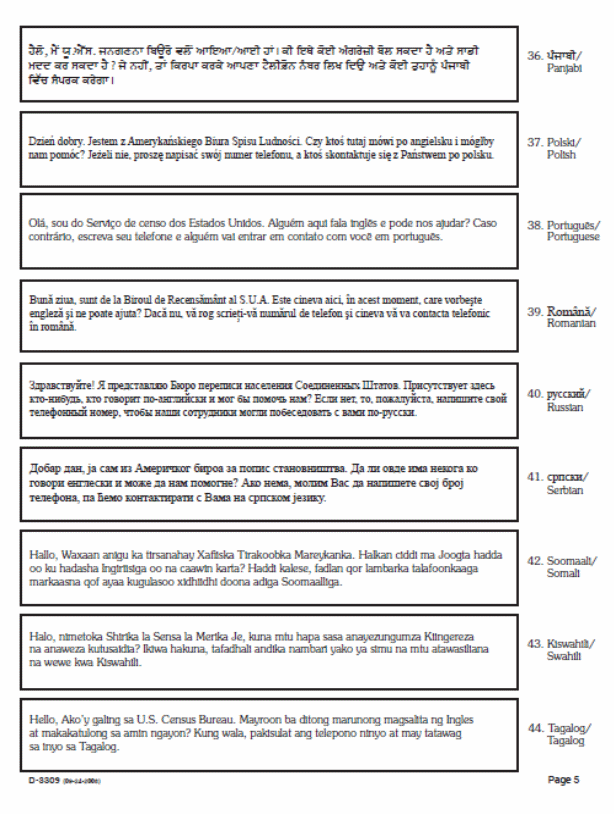
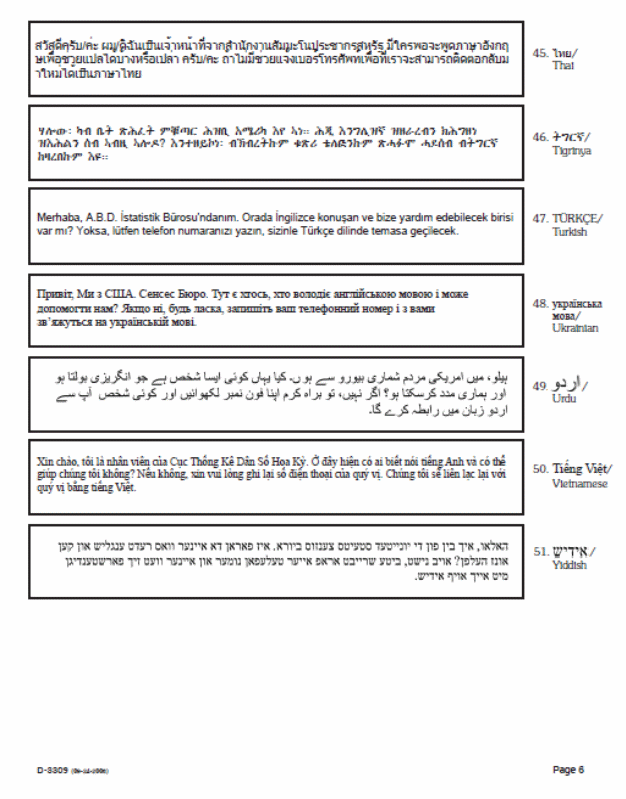
Census Information Sheet (to be used as a flashcard during testing).
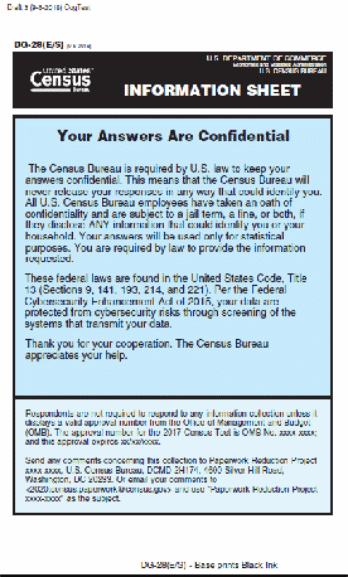
Vignettes
Vignette #1
Q1. Does this person speak a language other than English at home?
-

Yes

No
Q2. What is this language?
For example: Korean, Italian, Spanish, Vietnamese, etc.
Q3. How well does this person speak English?
-

Very well

Well

Not well

Not at all
Q4. Please write why you answered the way you did at Question 3.
Vignette #2
Maria and her husband Pedro both identify as [target origin] and were born in [target country]. They have a son who was born here in the US.
Q. What is this person’s race or ethnicity? Mark all boxes that apply AND print ethnicities in the spaces below. Note, you may report more than one group.
-

 White
— Print, for example, German, Irish, English, Italian,
Polish, French, etc.
White
— Print, for example, German, Irish, English, Italian,
Polish, French, etc.
_____________________________________________________________

 Hispanic,
Latino, or Spanish
— Print, for example, Mexican or Mexican American, Puerto
Rican, Cuban, Salvadoran, Dominican, Colombian, etc.
Hispanic,
Latino, or Spanish
— Print, for example, Mexican or Mexican American, Puerto
Rican, Cuban, Salvadoran, Dominican, Colombian, etc.
_____________________________________________________________

 Black
or African Am.
— Print, for example, African American, Jamaican, Haitian,
Nigerian, Ethiopian, Somalian, etc.
Black
or African Am.
— Print, for example, African American, Jamaican, Haitian,
Nigerian, Ethiopian, Somalian, etc.
_____________________________________________________________

 Asian
— Print, for example, Chinese, Filipino, Asian Indian,
Vietnamese, Korean, Japanese, etc.
Asian
— Print, for example, Chinese, Filipino, Asian Indian,
Vietnamese, Korean, Japanese, etc.
_____________________________________________________________

 American
Indian or Alaska Native
— Print, for example, African American, Jamaican, Haitian,
Nigerian, Ethiopian, Somalian, etc.
American
Indian or Alaska Native
— Print, for example, African American, Jamaican, Haitian,
Nigerian, Ethiopian, Somalian, etc.
_____________________________________________________________

 Middle
Eastern or North Africa
— Print, for example, Lebanese, Iranian, Egyptian, Syrian,
Moroccan, Algerian, etc.
Middle
Eastern or North Africa
— Print, for example, Lebanese, Iranian, Egyptian, Syrian,
Moroccan, Algerian, etc.
_____________________________________________________________

 Native
Hawaiian or Other Pacific Islander —
Print, for example, Native Hawaiian, Samoan, Chamorro, Tongan,
Fijian, Marshallese, etc.
Native
Hawaiian or Other Pacific Islander —
Print, for example, Native Hawaiian, Samoan, Chamorro, Tongan,
Fijian, Marshallese, etc.
_____________________________________________________________

 Some
other race or ethnicity
— Print race or ethnicity.
Some
other race or ethnicity
— Print race or ethnicity.
_____________________________________________________________
Language Information Form
Thank you for participating in today’s focus group. Please complete the following information sheet.
The following questions are about the English language. For each row, choose what best describes you: very well, well, not well, or not at all.
|
Very Well |
Well |
Not well |
Not at all |
DB1. How well do you speak English? |
|
|
|
|
DB2. How well do you read English? |
|
|
|
|
DB3. How well do you write in English? |
|
|
|
|
DB4. How well do you understand movies and videos in English? |
|
|
|
|
The next questions are about [target language].
|
Very Well |
Well |
Not well |
Not at all |
DB5. How well do you speak [target language]? |
|
|
|
|
DB6. How well do you read [target language]? |
|
|
|
|
DB7. How well do you write in[target language]? |
|
|
|
|
DB8. How well do you understand movies and videos in [target language]? |
|
|
|
|
Now, we would like to know how often you use English in certain situations. For each row, choose what best describes you: almost always, often, sometimes or “almost never.
Language use |
Almost always |
Often |
Some-times |
Almost never |
DA1. How often do you think in English? Would you say… |
|
|
|
|
DA2. How often do you speak English at home? Would you say… |
|
|
|
|
DA3. How often do you speak English with your friends? Would you say… |
|
|
|
|
| File Type | application/vnd.openxmlformats-officedocument.wordprocessingml.document |
| Author | Anna Sandoval Giron (CENSUS/CSM FED) |
| File Modified | 0000-00-00 |
| File Created | 2021-01-28 |
© 2026 OMB.report | Privacy Policy